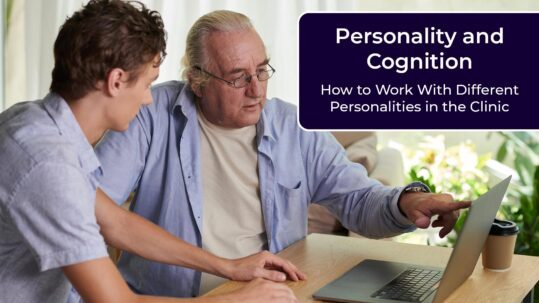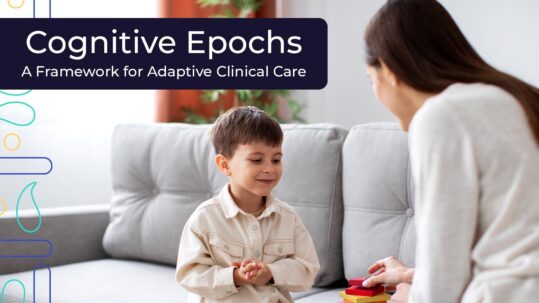Getting Diagnosed with ADHD as an Adult
While attention-deficit/hyperactivity disorder (ADHD) is often associated with children, it is becoming increasingly recognized as a condition that persists throughout life, and sometimes remains undiagnosed until adulthood. Whether you’re a clinician supporting an adult client through this process or someone personally navigating an ADHD evaluation, understanding what late diagnosis means and how it impacts cognitive and emotional well-being can make a world of difference in one’s quality of life and engagement in meaningful activities.

Why ADHD Can Go Undiagnosed Until Adulthood
Once labeled as “daydreamers,” “disorganized,” or “underachievers,” many adults are now learning that they have ADHD. Especially for those who excelled academically or used compensatory coping strategies, the signs may have been subtle enough to go unnoticed in childhood. So, what makes people more likely to be diagnosed in adulthood?
Common reasons for adulthood ADHD diagnosis include:
- Masking Behaviors: Many people learn to hide symptoms or overcompensate by being overly organized or perfectionistic.
- Gender Differences: ADHD in women is often under-diagnosed, as symptoms may present more as inattentiveness, as opposed to hyperactivity.
- Changing Life Demands or Circumstances: New responsibilities and experiences, such as college, career, and parenting, can intensify executive functioning challenges that were once manageable.
- Co-occurring conditions: Another diagnosis may overshadow ADHD symptoms, making them appear less prominent. This may include anxiety, depression, or learning differences.
The Diagnostic Process
Individuals who suspect that they may have ADHD may find getting a diagnosis helpful. Here’s an overview of how the diagnostic process typically goes:
- Clinical Interview: A healthcare provider (such as a psychiatrist, psychologist, or neuropsychologist) gathers a detailed past medical history of symptoms, including how they’ve shown up across different stages of life.
- Standardized Assessments: Questionnaires and cognitive tests may be used to assess attention, impulsivity, working memory, and executive functioning.
- Supporting Information: Input from family members, partners, or school/work records can help provide additional context.
- Eliminating Differential Diagnoses: Providers consider other possible conditions that may mimic ADHD symptoms, such as depression, trauma, anxiety, depression, sleep disorders, or thyroid issues.
Having an official diagnosis can bring much relief and answers to personal life challenges for an adult. To learn more details about the diagnostic process, check out Children and Adults with Attention-Deficit/Hyperactivity Disorder’s (CHADD) article on adult ADHD diagnosis.. While a diagnosis can provide some clarity, it is just the beginning of understanding the unique puzzle of how one’s brain works and how they may best be supported.
Cognitive and Emotional Impacts
ADHD affects various domains of cognition, such as:
- Attention/focus
- Working memory
- Planning and organization
- Impulse control
These challenges can impact multiple areas of one’s life, from completing daily tasks to sustaining meaningful relationships. Individuals may experience emotional burnout from years of misunderstandings of their struggles. Frustration, shame, and overwhelm are common feelings.
After Diagnosis
Following diagnosis, adults may begin exploring tailored management strategies to meet their individual needs. A comprehensive approach may often include:
- Education and self-awareness: Understanding ADHD helps reduce self-blame and promote self-compassion.
- Behavioral or Cognitive Behavioral Therapy: Working with a therapist to develop organizational, planning, and emotional regulation skills
- Medication management: Stimulant or non-stimulant options can support attention and impulse control under medical supervision. Vitamins and supplements may also support healthy brain function.
- Coaching: Some people find it helpful to find a life coach or someone trained as an executive functioning skills coach.
- ADHD organizations: leaning on support and resources from ADHD-based organizations, such as the Attention Deficit Disorder Association
- Lifestyle supports: Exercise, sleep hygiene, nutrition, and mindfulness practices may assist in focus and mood.
Supporting Clients with ADHD
Therapists can collaborate with clients to implement strategies like the following:
- Chunking: breaking tasks into smaller, manageable steps
- Reminders: using visual schedules or timers
- Calming techniques: practicing mindfulness or breathing for grounding
- Practice: completing cognitive activities and tasks for building sustained attention skills
Conclusion
Beyond a “label”, an adult ADHD diagnosis is about having a better understanding of one’s own thinking, and then implementing supports to improve functioning. Increasing self-awareness, acceptance, and problem-solving skills is key to improved well-being. With the right tools, strategies, and external support, individuals can transform ADHD from day-to-day struggles into an opportunity for both self-discovery and flourishing.









